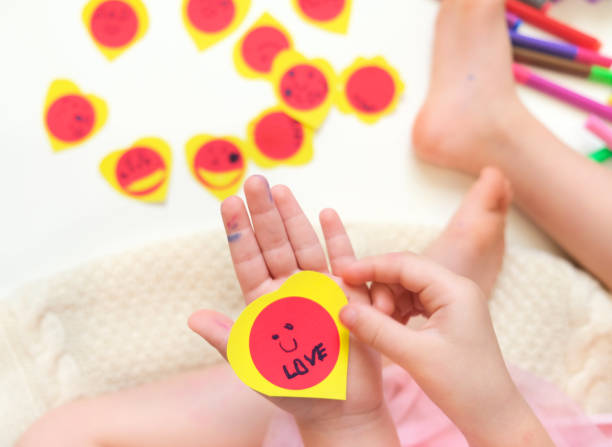Why Teaching Kindness and Empathy Matters
In today’s fast-paced world, kindness is not just a “nice-to-have” it’s essential. Empathy helps kids connect, build friendships, resolve conflicts, and understand others. Kindness builds self-esteem and makes the world a better place.
At GentleRaising, we believe that gentle parenting includes raising emotionally intelligent and compassionate kids. These activities are perfect for toddlers to tweens and can be done at home, in school, or even during playdates.
1. Kindness Jar Project
What You Need: A clean jar, sticky notes, markers.
How It Works:
Every time your child does a kind act (sharing a toy, comforting a friend), they write or draw it on a note and place it in the jar. At the end of the week, read them together and celebrate!
Skill Boost: Reflection, emotional recognition, positive reinforcement.
2. Feelings Charades
Turn charades into an emotional intelligence game!
How To Play:
Write down different feelings (happy, sad, excited, nervous) on slips of paper. Kids take turns acting them out while others guess.
Why It Works:
Kids learn to recognize emotions in others key to empathy.
3. Compliment Chain
What You’ll Need: Strips of paper, pens, stapler or tape.
How To Play:
Each child writes a compliment about another on a paper strip and connects it to form a chain. By the end of the week, you’ll have a heartwarming, visual reminder of kindness.
Best For: Classrooms or sibling bonding.
4. Storytime With a Twist
Choose books that showcase empathy and kindness (like The Invisible Boy or Have You Filled a Bucket Today?)
What To Do:
Ask questions like:
- How did the character feel?
- What would you do in their place?
Why It Works:
Reading + emotional perspective = empathy in action.
5. Kindness Bingo
Create a bingo card with tasks like:
- Smile at someone
- Say “thank you”
- Help clean up
- Write a thank-you note
Make it fun: Give a little reward when they complete a line!
6. Thank You Card Station
Set up a DIY card-making corner.
Encourage kids to make cards for:
- Teachers
- Delivery workers
- Family members
- Community helpers
This simple activity teaches appreciation and thoughtfulness.
7. Role Reversal Play
Pretend to be someone else for the day a teacher, sibling, or even a pet!
Discuss afterward:
- “How did it feel to be in their shoes?”
- “What was hard or easy?”
Benefit: Encourages perspective-taking, the foundation of empathy.
8. Kindness Scavenger Hunt
Create a list of kind actions for your child to “find” or do, such as:
- Hug someone
- Hold the door
- Pick up litter
- Invite someone to play
Make it a game, not a chore!
9. Empathy Art Station
Use drawing, painting, or collage to express feelings.
Prompt ideas:
- Draw what kindness looks like.
- Paint someone else’s “best day.”
Why It Works: Art helps kids understand and process complex emotions.
10. Listening Circles
Create a no-interruption zone where each person shares how they’re feeling.
Model active listening:
- Eye contact
- Nodding
- No interrupting
It’s powerful when kids realize their words matter too.
11. Care Packages for the Needy
Assemble small packs with essentials:
- Snacks
- Wipes
- Socks
- Notes of encouragement
Hand out during a walk or donate to a shelter.
Inspire compassion through action.
12. Mirror Messages
Write uplifting notes on mirrors:
- “You are brave!”
- “You are kind!”
Let your child write one for a sibling, friend, or even themselves.
Builds self-kindness, which extends outward.
13. Empathy Dolls or Stuffed Animals
Encourage your child to care for a toy as if it had feelings.
Prompt questions:
- “What does Teddy need today?”
- “How can you help Bunny feel better?”
Teaches nurturing and emotional cues.
14. Gratitude Sharing at Dinner
Take turns sharing:
- One thing you’re thankful for
- One nice thing you did today
- One kind thing someone did for you
Consistency turns this into a cherished family habit.
15. Weekly Kindness Goals
Choose a theme every week:
- “Helping Hands Week”
- “Say Something Nice Week”
Set one goal per child and track it with fun stickers or stars.
End the week with a mini kindness celebration!
Bonus Tips for Parents: Modeling Matters
Kids don’t just listen they watch.
- Apologize when you’re wrong.
- Treat others (including them) with empathy.
- Talk about your feelings out loud.
These daily actions build a powerful model of gentle living.
Final Thoughts: Kindness is Taught Through Living
Teaching kindness and empathy isn’t about lectures it’s about creating moments. The more kids do kind things, the more they become kind people. Let this list guide your parenting and play. Every act, no matter how small, shapes a compassionate world.
